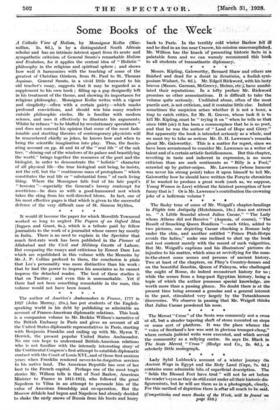Some Books
of the Week A Catholic View of Holism, by Monsignor Kolbe (Mac- millan, .2s. 6c1.), is by a distinguished South African scholar and has an intrinsic interest apart from its acute and ..syMpathetic criticism of General Smuts's remarkable Holiiin and Evolution, for it applies the central idea of " Holistic " philosophy in the religious and. spiritual sphere ; and shows how well it harmonizes with the teaching of some of the greatest of Christian thinkers, from St. Paul to St. Thomas Aquinas. General Smuts, in a vivid little foreword to his old teacher's essay, suggests that it may be regarded as a supplement to his own book ; filling up a gap designedly left in his treatment of the theme, and showing its importance, for religious philosophy. Monsignor Kolbe writes with a vigour and simplicity—often with a certain gaiety—which masks Profound convictions, and should win him many readers outside philosophic circles. He is familiar with modern science, and uses it effectively to illustrate his arguments. Whilst he refuses " to be bluffed by revolutionary speculators " and does not conceal his opinion that some of the most fash- ionable and startling theories of contemporary physicists will be remembered chiefly as jokes, he knows how and when to bring the scientific imagination into play. Thus, the fasein- ating account on pp. 43 and 44 of the " real life " of the oak -tree, " shining out of the windows of its palace and beautifying the world," brings together the resources of the poet and the biologist, in order to demonstrate the " holistic" character of all physical life—the true biological unit being, he insists, not the cell, but the " continuous mass of protoplasm " which constitutes the real life or " substantial form " of each living thing. Where the Monsignor falls foul of his late pupil's " heresies "—eSpecially the General's breezy contempt for asceticism—he does so with a good-humoured zest which takes the sting from his well-directed blows. In fact, one of his most effective pages is that which is given to the successful defence of the very difficult case of St. Simeon Stylites,


































 Previous page
Previous page